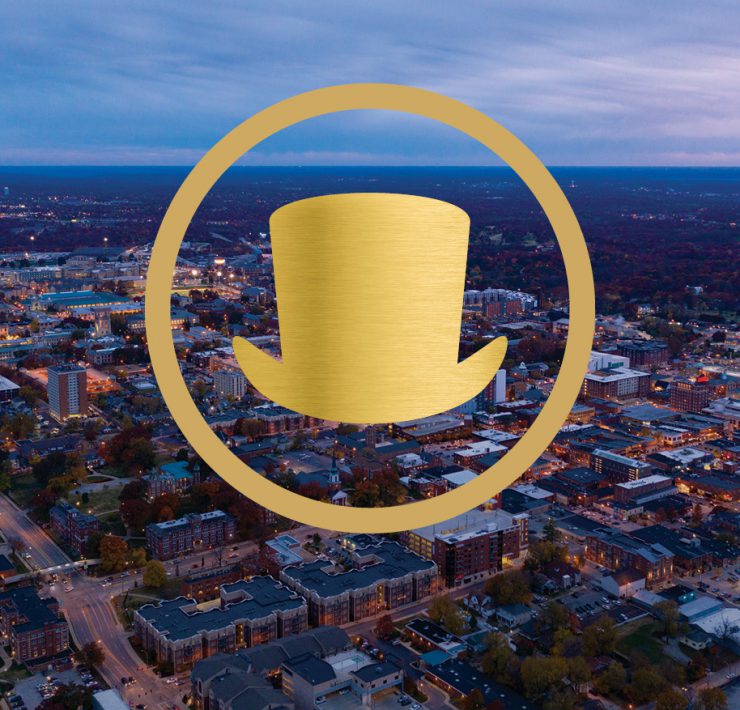The Impact of Columbia's Airbnb Market

It constituted little more than an afterthought during the discussions that crafted the City of Columbia’s new zoning code in the summer of 2015.
Shouldn’t we do something about these Airbnbs?
At the time, Columbia didn’t have that many properties listed on Airbnb, the vacation rental website that allows people to advertise short-term rentals to willing consumers. How the burgeoning service could affect the city didn’t really generate much discussion.
That has changed considerably in the three years since.
According to Airbnb’s figures, Columbia was Missouri’s fourth-most active city on the site in 2017, trailing only St. Louis, Kansas City, and Branson. Columbia Airbnb renters welcomed 11,140 guests into their homes (or apartments . . . or condos . . . or lean-tos . . . or tents occupying a vacant lot . . .) last year, generating a total of $1.1 million in income.
Last August, the month of the total solar eclipse, 355 listings were available for rent in Columbia. In September, a month in which the Missouri football team played four straight home games, Airbnb hosts raked in more than $551,000.
The numbers have leveled off a bit since then, but, as of February, there were still 284 active rentals in the city. Now is definitely time for the discussions that got tabled in 2015.
“We’re trying to stay ahead of the curve,” says Megan McConachie, strategic communications manager for the Columbia Convention and Visitors Bureau. “A lot of destinations our size, or even smaller, are trying to catch up to this really big trend in how people are traveling.”
The Convention and Visitors Bureau and the city’s Community Development Department teamed up to hold a series of four public information meetings — two in February, two in April — to gather comments and determine what sort of legislation would be beneficial on a municipal level to regulate the short-term rental market available on sites such as Airbnb.
Right now, there isn’t much on the books. Some short-term rentals already meet the city’s safety inspection requirements because they’re repurposed long-term rentals. Does that mean all short-term rentals should meet the same requirements? Do short-term rentals meet the city’s definition of a “hotel,” and if they do, should they have to pay the same lodging tax as the city’s hotels and motels? What sort of recourse does a neighbor have if the house next door becomes a short-term rental property against their wishes?
Questions like these are just the tip of the iceberg.
“We just don’t have enough in our code, even for people who want to do the right thing,” said Leigh Kottwitz, the city’s neighborhood services manager. “We just don’t have enough information to tell them because we haven’t laid that out. We just haven’t defined it in our code.”

What is a hotel, anyway?
How, exactly, does the City of Columbia define a hotel? At present, as any property with 12 units or more that rents out for 28 days or fewer. These properties are subject to a five percent tax with the city, which goes toward funding the Convention and Visitors Bureau as well as bankrolling the Columbia Regional Airport terminal project.
So no, Airbnb rentals are not currently hotels. In February, Airbnb started factoring Missouri state, city, county, and local sales taxes into its pricing. Airbnb says it collected and remitted more than $306,000 in taxes to the state of Missouri in the first month of this new arrangement. Columbia’s hotel and motel tax is not included.
For a million-dollar-a-year industry, that tends to add up. Or not add up.
“If you look at Airbnb itself as one hotel that subcontracts to all these houses around town, they’re a pretty big hotel,” says Shawna Neuner. She and her husband, Rick, manage long-term rental properties that they sometimes post on Airbnb. “And yet, it’s not your traditional commercial property. So it’s kind of a tricky area to figure out how you word that.”
How do you reclassify the definition of a “hotel” in the city so that Airbnb properties fall into it? Do you keep the 28-day limit but lower the number of units down to one?
That would certainly catch all the Airbnb properties, but then you could run into some other complications. Mark Farnen, co-founder of City Watch Columbia, a consulting service for various business communities in the city, can see a fairly glaring one.
“If you define everybody as a hotel, guess what? In the zoning code, hotels are not allowed in residential areas,” Farnen says. “It would’ve been a ban on them, or at least made a conflict in the code.”
At the public comment meetings, some Airbnb owners also expressed concern that an extra tax would put a severe crimp in their business by raising the price of their listings to an extent that would scare off potential renters. This is a concern that resonates most among Airbnb hosts who only rent out a room or two on their property rather than an entire house or apartment.
Randall Kilgore and Gary Smith have one property on Airbnb, dubbed the “Fairway Suite.” It was built originally as an addition on their home for Kilgore’s mother but, after she passed away, the two started offering it as a short-term rental.
Kilgore and Smith say an additional tax probably wouldn’t hurt their business too much, but they’re still wary of being grouped in with the city’s hotels. They would like to see the creation of an Airbnb hosts association in Columbia to give this new classification of lodging a unified voice.
“We do not believe Airbnb properties such as ours should be levied a tax like a hotel or motel lodging establishment because that is not what we are,” they said in an email. “At a minimum, we believe the city of Columbia should have a mechanism for obtaining a proper registration and/or renewable business license that is tiered based on size, occupancy, location, parking availability, and adherence to public safety ordinances. Too much regulation and inappropriate taxation without proper representation will affect this otherwise ‘mom and pop’ type of business.”
Neighborhood watch
Pat Bess is one of the owners and operators of Community Association Management, which helps manage more than 50 homeowner and condominium associations in and around Columbia.
There is a variety of opinions when it comes to short-term rental properties cropping up in established residential neighborhoods, but Bess said the feeling among the organizations she oversees is consistent. None of the boards of directors with which they consult have codes that favor Airbnb properties in their neighborhoods.
“It is pretty uniform that neighbors do not like the fact that someone different could be staying in the home or condo each week or month,” Bess said.
That’s the main fear coming from the homeowners community when it comes to the growing Airbnb scene in Columbia: not knowing who is living next door at any given time.
The city zoning code allows for no more than three or four unrelated people to live in a unit at one time, with some leeway built in for guests coming to stay for short periods. Neighborhood services enforces that ordinance, but Kottwitz says it’s a gray area when it comes to short-term rentals.
If you’re limiting the number of people who can occupy a short-term rental unit — say, a whole house — to only three or four, how much of a dent does that put in the Airbnb market? And if you don’t enforce a limit, how is it fair to the neighbors if, say, 22 people show up for a Mizzou football weekend?
Kottwitz says neighborhood services doesn’t get a large volume of complaints considering the number of short-term rentals in the city, but there have been some.
“Sometimes there are issues with parties, traffic, and parking,” Kottwitz says. “The other challenge we have is when those folks call and have a complaint, because we haven’t addressed those properties in our code, we don’t have an answer for them. We don’t have much the city can do at this point to have any enforcement authority over those properties.”
Kottwitz said other cities have ordinances dealing with short-term rentals that Columbia could mine for ideas: limiting occupancy for short-term rentals to two people per bedroom plus two to four people, for example. That would allow for large groups to continue patronizing Columbia’s Airbnb market while still exerting some sort of control on party size.
Farnen says he doesn’t think Columbia wants to drive large groups out of town. What about the Show-Me State Games youth baseball team that doesn’t have the means to rent a block of hotel rooms?
“A lot of people are worried about ‘what if’ instead of what is. That drives a lot of the emotional side of the debate,” Farnen says. “Do you legislate based on anecdote or fact?”
The Airbnb hosts can do their part as well. Kilgore and Smith said that, before they listed the Fairway Suite in October 2016, they checked with the city’s Planning and Zoning department, their neighborhood association, and their neighbors to make sure they weren’t running afoul of anyone.
They have strict admonitions against noise, partying and “unruly behavior” in their house rules.
“It was very important to us as hosts and good neighbors to be certain we had the confidence of the neighborhood association, and that we were doing business in such a way as to not be intrusive in any way,” they wrote in an email.
A level playing field
One segment of Columbia’s short-term rental hosts was already cleared and zoned to rent before the Airbnb phenomenon, with all the necessary safety inspections completed.
They’re the long-term renters, landlords with houses, apartments, and condominiums for lease. When some of their properties sit vacant for extended periods of time, they’re looking for ways to offset their losses. Realtor Betsy Woodruff has just such a client. He uses some of his properties as short-term rentals, but has to juggle the possibility that he’s missing out on some longer-term tenants in order to do so.
“It’s kind of risky for an investor or landlord to have that property, and maybe you have no reservations for February and you don’t know when you’re going to get them,” Woodruff says. “The unit still gets the wear and tear just like a tenant would put on the property. It’s hard for a landlord, because every day that sits empty, they’re paying utilities, property taxes, all those things.”
Shawna and Rick Neuner have been posting some of their properties on Airbnb since last summer. They had eight rented out at once during homecoming weekend, but Shawna says the pair can usually only manage four or five at a time. That’s how many they booked during the eclipse and during this year’s True/False Film Festival.
Starting out, the biggest hurdle for them was deciding to keep certain properties empty instead of having them on the market for more traditional leases. Once they decided to make the move, they also had upfront costs of furnishing the short-term units and paying for utilities.
They have seen some perks from their association with Airbnb.
“When it’s staged, it helps it rent faster,” Shawna says. “We find that the properties we’ve listed on Airbnb will get long-term rentals on it because it’s easier to see that space and what it’s going to look like going forward. It ends up being something where we do a lot of furniture moving from one property to another.”
But what about the properties that aren’t converted long-term rentals, those that haven’t gone through the city’s inspection protocols?
Well, there is no set protocol for short-term rental units registering in the city. Kottwitz says that the most the city can do when it becomes aware of a new short-term rental is to kindly ask the owners to be in compliance with city code.
“When people come to us and ask what they need to do to comply with city code, we often encourage those property owners to get their property registered and inspected as an act of good faith,” Kottwitz says. “Many have been happy to do that. We also realize we don’t have anything in our code that talks about this specifically. When there are people who don’t want to do it, we don’t have good standing to make them or take them to court for that.”
Even if the city were to normalize the process for registering and inspecting short-term rental properties, there’s no guarantee it would catch them all. You can comb Airbnb listings for addresses, but that wouldn’t capture those listed on other vacation rental sites, of which there are currently around 35, according to Farnen. Not to mention even more informal arrangements: A friend comes into town, stays a night and leaves $50 on your kitchen counter. Does that make your place a short-term rental unit?
For now, it’s one of the many unanswered questions the city is grappling with concerning a real estate trend not many envisioned. A lot can change in three years.
“I get the sense that the city is really trying to understand the whole issue and figure out what, exactly, they do need to address it and how to be the most equitable to all parties,” Shawna says. “They want to make sure that, if people are staying in a home, that it’s safe. And they want to get their tax money. How do you stay on top of it?”








